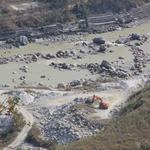Political settlements and the historical development of sand governance in Morocco
Discussions on sand in Morocco often centre on illegal extraction by sand mafias. This article aims to understand the historical formation of sand extraction near Rabat and the interrelation between legal and illegal extraction. Using a political settlements framework, we aim to contribute to the literature on sand governance. We show how the development of legal frameworks for sand extraction have been closely tied to political settlements and infrastructural development as a key component of the settlement's configuration. This dates back at least to the French Protectorate's urban policy of the “Grands Chantiers” which saw the emergence of the first law pertaining to sand quarries, but can also be seen in more recent times under Mohammed VI, with a resurgence of a public policy of large-scale infrastructure, but also a new sand law. Moreover, the shifts in clientelist politics as part of political settlement development heavily impacted both on the elites engaged in sand mining, as well as the capacity of these elites to engage in both illegal and/or legal sand extraction. Under the current settlement, a new class of businessmen holding private titles to (sand) land have become key players in sand extraction, at the detriment of (military) elites who used to extract sand on state and communal lands, using their close connections to the Makhzen state to allow for illegal extraction. Our article shows that efforts for sustainable sand governance should first takes into account the political relations enabling particular forms of legal and illegal extraction before implementing technical solutions.
https://doi.org/10.1016/j.exis.2023.101245
Lahcen Ameziane





